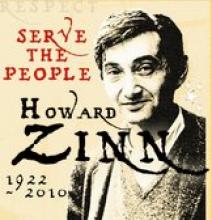Many of you are probably familiar with Howard Zinn’s, People’s History of the United States. If you’re not, it is the definitive “other version” of the history of our country from its genesis in the arrival of Christopher Columbus, through colonization, formation of the union, all the way to the 2000 election of George W. Bush to the White House.
Originally published in 1980, this book is not revisionist history so much as un-revisionist. If history is truly written by the winners, Howard Zinn seeks to reveal the truth of our history from the people that paid the steepest price; the native, the minority, the poor, the “losers”. Pain-stakingly researched and impeccably reported, this book provides an incredible outside perspective totally different from the history many of us learned in our formal education.
So astounding and irrefutable is Zinn’s contribution in this heavy volume that his book has been adopted as text for collegiate level students in many private colleges (state universities and secondary schools are much less likely to follow suit, understandably). Apparently we want to fully indoctrinate our children before we educate them.
The volume is incredibly rich with quotations, documented materials, footnoted and referenced to the point where argument would be difficult, even impossible. However, it also makes it less accessible (it is, after all, a textbook). For all of those readers out there that lack the time, patience, or inclination to mine the book’s pages, I’ve decided that each week I will summarize a chapter of the book (there are 25 chapters moving from “discovery” though the 2000 election). I feel this is a great way to shore up some job security, further educate our readership about the reality in this country, and continue the tradition of “bloggery” (re-casting information in an easily consumable, bite-size form).
I begin the very first post in the series not with Chapter 1 then, but with my intent and some information about the author; Howard Zinn (1922-2010).
He was born into the working class to immigrant parents, grew up in the shipyards, and flew bombing missions during World War II. These experiences no doubt shaped his perception of the world, and his fervent anti-war positions. On the G.I. Bill, he received his doctorate in history. He was fired from his first professorship for supporting student protesters during the civil rights movement. He then went to teach at Boston University, where he spent the rest of his formal career. His life’s work, however, was writing, lecturing, and promoting civil rights and political justice around the world. His autobiography, It’s Hard to Be Neutral on a Moving Train, is a testament to his commitment that all people, of all shades, creeds, and levels of wealth, be free of the exploitation of nations and the powerful. There is no greater calling than that.
What impresses me most about the man, like other humanitarian intellectuals like Daniel Quinn, Noam Chomsky, Al Gore, and many others, is that despite this country’s sometimes aggressive disregard for logic and ethics, he nonetheless spent his life attempting to make that those in the dark see the light. For more information about Howard Zinn, his work, and his writings, visit the website of his nonprofit, www.howardzinn.org.
Photo from dailycensored.com
